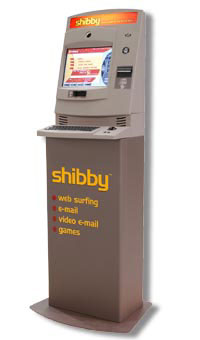Article
Internet access kiosks get shibby at Denver airport
A pay-per-use public Internet kiosk will provide a valuable service and generate real revenue for its owner, according to developers of the Shibby kiosk.
December 18, 2002
NetShift Software Ltd. and Kiosk Information Systems (KIS) have combined efforts to create Shibby, a pay-per-use public Internet kiosk they say will provide a valuable service and generate real revenue for its owner.
KIS president Rick Malone said that if the Shibby is successful in its trial run in Denver, it will market the kiosk throughout the country.
KIS installed eight Shibby modules of four units each in Colorado's Denver International Airport (DIA) on Nov. 27, just in time for the holiday travel season, as part of a three-year contract with the airport. The kiosks offer Web Surfing, traditional and video e-mail and games. The cost to users is 25 cents per minute.
 |
Shibby is touted as a dream for operators because it's a plug and play model. All it requires is a phone line and power supply to operate. |
According to Bob Gallner, NetShift's U.S. vice president of sales, the goal of the Shibby project is to create a system that incorporates the best available kiosk software, hardware and services. The industry is plagued, he said, by a history of failed projects.
Malone said he got the idea for the name from his children, who use it to describe things that are good, cool or awesome.
"We're really interested in creating a compelling argument for why this should work - that we can take the same application or same philosophy and put it into different markets and make it work for other people as well," Gallner said. "It's all about the return on investment (ROI) so we really came up with what we feel is a compelling interface design with really easy navigational tools and are providing content and services that we think the public might enjoy."
Shibby is touted as a dream for operators because it's a plug and play model. All it requires is a phone line and power supply to operate. Remote monitoring software is used to keep the kiosks running, and provide usage reports.
The per-minute rate can vary. At 25 cents per minute a kiosk being used for two hours a day would generate $900 a month. The kiosk accepts cash or credit card payments.
Colorado-based KIS installed Shibby units in several locations around Boulder, Colo., including two hotels, a restaurant and a medical center, for testing in July 2002.
"They're running smoothly," Malone said. "We haven't quite got the revenue numbers out of there that we wanted, but we haven't really been pushing it at all. It's just been a matter of making sure they are operating."
Malone declined to reveal revenue data on the trial. He said he plans to perfect the system before marketing the units.
"KIS has developed this as a product for the greater good of our development of Internet terminals," Malone said. "It's not our ambition to be operators of public Internet terminals, but by operating small networks, we learn a lot more about the problems our customers have and as a consequence too we can develop better products."
Malone said KIS learned several lessons from the Boulder pilot, and felt confident that Shibby was ready for its unveiling at the Denver airport.
Test by fire
Airports, of course, are a natural location for Web-enabled kiosks. That doesn't mean every project that's been installed at an airport has succeeded.
"When you look at the airport it's a pretty obvious choice although we've known people who have not been successful in the airport," Malone said. "We feel very strongly that this program will succeed and the early numbers indicate that absolutely it will succeed."
Pete Snyder, vice president of marketing at KIS, said ATT has been offering internet access at airports in its existing telephone booths without success.
"Nobody goes to phone booths in the first place," Snyder said. "By putting them (internet kiosks) in existing enclosures your fooling yourself."
KIS plans to add six more modules around the first of the year, once it is sure the existing terminals are running smoothly.
Malone believes recent increases in airport security, requiring laptops to be removed from their cases and sent through metal detectors, may encourage more travelers to use the new terminals.
"A lot of business travelers aren't taking their laptops because of the hassle of getting through security," Malone said. "The Shibby product is targeted at business travelers who want to check e-mail or as an entertainment factor for those who may have time to burn."
Mukul Krishna, an industry analyst for Frost & Sullivan, said tighter security isn't discouraging laptops. He said the security process for cell phones, PDAs or laptops only takes a few extra minutes.
"The main problem has been the proliferation of home PCs and other devices," Krishna said. "There were a lot of kiosks that blossomed around the mid- to late-90s and the Internet became more popular and much more accessible so a lot of these kiosks started disappearing."
Security on public kiosks is also a concernfor users. Most kiosks, including the Shibby, use 128-bit encryption, he said. Many people aren't satisfied with that level of security, and are hesitant to use systems with anything less than a 512-bit system.
"Through an Internet kiosk you can mostly access Yahoo!, Hotmail or AOL accounts," Krishna said. "When you are looking at sending information across them, professionals are going to be wary of using an easily hackable e-mail system."
Finding the ROI
Malone said that initial feedback from kiosk users is encouraging.
"They've been running and there seems to be every indication that they'll be successful at this point," Malone said. "Our numbers are coming in line with what we expected and we only plan to improve the revenue stream from here on out."
Although Malone wouldn't reveal revenue generated by the Shibby, he said the business model relies on user fees exclusively.
"Advertisement has not been successful as an ROI (return on investment) for public Internet terminals in effect," said Malone. "Most we know who have gone down that path have not succeeded. The pay-per-use scenario, at least for us at this point, seems to be proving itself out quite well."
Joseph Nakhla, chief marketing officer for Info Touch Technologies, said depending on any one service, such as e-mail access, as a primary source of revenue is a risky business.
"You cannot just go out and 100 percent depend on one revenue stream through your terminals," Nakhla said. "You have to have a strategy that entails other revenue streams like advertising, transactional applications as well as pay for use. The moment you reach that balanced level of income is the moment you'll give your network a very strong chance to be profitable."
Info Touch has incorporated many revenue sources into its popular ZapLink terminals, which offer users Web and e-mail access, online banking, bill payment services, insurance sales, video teleconferencing and map finders. In Phoenix, the Zaplink terminals have proven popular with wireless phone users as a way to pay their phone bills.
Nakhla said Info Touch deploys 50 to 100 kiosks every month, includng ZapLink terminals. ZapLink units were introduced in 2001 and have been installed in such locations as Circle K, Chase Manhattan Bank, McDonald's Restaurants and U.S. military bases. The company has deployed more than 10,000 terminals in more than 55 countries.
Convincing advertisers to embrace public Internet access terminals as a way to reach potential customers can be difficult. according to both Malone and Nakhla.
"We've been successful because we've been 100 percent focused on it," Nakhla said. "It comes from experience in the industry and it comes from being able to take and convert that prime real estate that you have - the great technology that you're using - into a solid selling proposition to the advertiser."
Malone said advertisers will support Shibby once it proves itself in the market. "The DIAis really the first public push we've put out there," Malone said. "It's using the most polished software and we've done a lot of changes to hardware and software configurations to find the right combinations. The Shibby DIA operation, after the first 19 days, is an obvious winner."
[Editor's note: Info Touch Technologies became Tio Networks in April 2006.]










